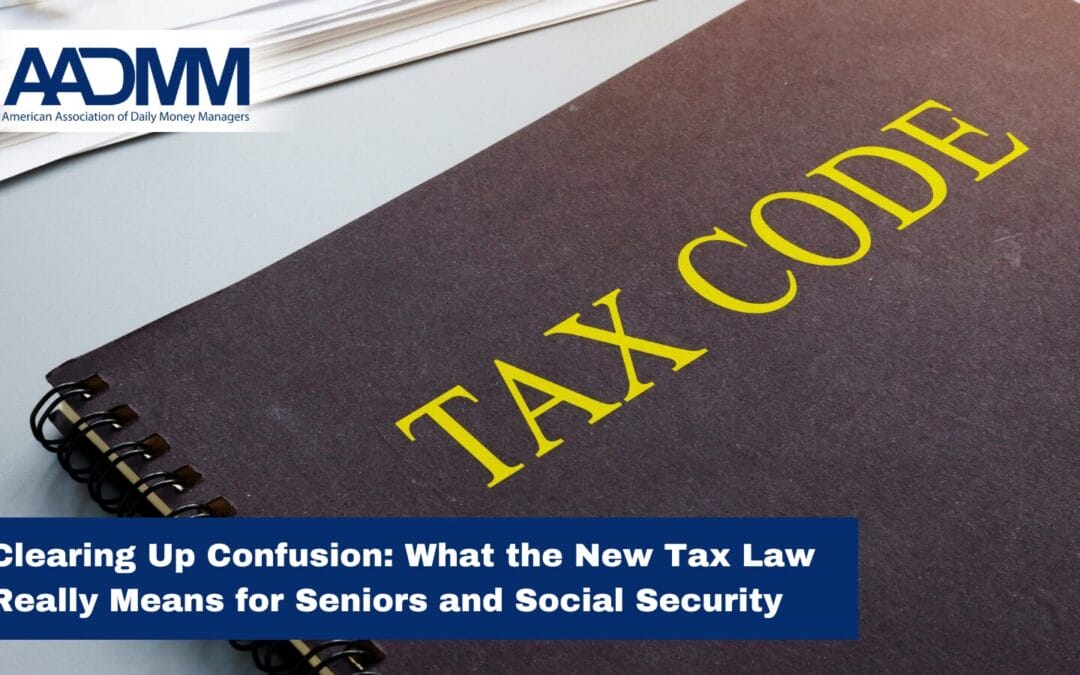Clearing Up Confusion:
What the New Tax Law Really Means for Seniors and Social Security
Many of you received an email from the Social Security Administration on July 3 about the new tax law called the “One Big, Beautiful Bill.” I want to clear up some confusion, especially since many of you are over 65 and receive Social Security benefits.
Yes, the email is real. But some of the claims in it are misleading. Let’s break down what’s actually changing—and what isn’t.
The email claimed:
“The new law includes a provision that eliminates federal income taxes on Social Security benefits for most beneficiaries, providing relief to individuals and couples.”
- The new tax law did not change the way Social Security benefits are taxed.
- The process used to pass this law (called “budget reconciliation”) does not allow Congress to change how Social Security benefits are taxed.
- There is no provision in the new law that eliminates federal tax on Social Security benefits.
The law does include a new tax break for seniors, but it is not specific to Social Security. Here’s what you need to know:
- Taxpayers age 65 and older are eligible for an extra deduction of up to $6,000.
- If you’re married and both spouses are 65+, you both can claim this deduction.
- You don’t have to be receiving Social Security to qualify—just be age 65 or older.
- If you’re under 65 (even if you receive Social Security or SSDI), you are not eligible for this extra deduction.
- The deduction can reduce all taxable income (not just Social Security).
- It is a deduction, not an exclusion—so you still need to report Social Security income on your tax return.
- This deduction is not refundable. If your total deductions are more than your income, you won’t get extra money back.
- Married couples must file jointly to claim the deduction for both spouses, and both must have Social Security numbers.
- The deduction phases out for higher incomes:
- For joint filers: starts to phase out at $150,000 Modified Adjusted Gross Income (MAGI), gone completely at $350,000.
- For single/head of household: starts at $75,000, gone at $175,000.
- This is a temporary provision—it only applies to tax years 2025 through 2028.
- The provision is just a small part of the much larger “One Big, Beautiful Bill.”
The email from the Social Security Administration also claimed:
“The bill ensures that nearly 90% of Social Security beneficiaries will no longer pay federal income taxes on their benefits.”
This statement is exaggerated.
- The estimate assumes everyone uses all their deductions only against Social Security income, which is rarely the case.
- Most retirees have other taxable income (like pensions, IRA withdrawals, or investments), so Social Security benefits may still be taxed.
- The way Social Security benefits are taxed has not changed.
- Social Security benefits are still taxed the same way as before.
- The new law gives an extra deduction to people age 65+, which may reduce your tax bill if you qualify.
- None of these changes specifically eliminate taxes on Social Security benefits.
If you’re unsure how these changes affect you, or if you want to know how your Social Security benefits will be taxed, please contact your tax advisor. Please Note: There are other tax provisions in the “One Big, Beautiful Bill,” that are likely to affect taxpayers. We will share more as we continue to review this legislation.
Katherine (Katie) Gudgel is a Daily Money Manager, Tax Professional and Enrolled Agent, and owner of Gudgel Professional Services
Katie will be talking about this as well as other recent tax law changes at the AADMM Conference in San Antonio, Texas, Nov. 7-9, 2025.





















